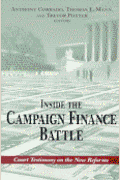In 2002 Congress enacted the Bipartisan Campaign Reform Act (BCRA), the first major revision of federal campaign finance law in a generation. In March 2001, after a fiercely contested and highly divisive seven-year partisan legislative battle, the Senate passed S. 27, known as the McCain-Feingold legislation. The House responded by passing H.R. 2356, companion legislation known as Shays-Meehan, in February 2002. The Senate then approved the House-passed version, and President George W. Bush signed BCRA into law on March 27, 2002, stating that the bill had “flaws” but overall “improves the current system of financing for federal campaigns.” The Reform Act was taken to court within hours of the President’s signature. Dozens of interest groups and lawmakers who had opposed passage of the Act in Congress lodged complaints that challenged the constitutionality of virtually every aspect of the new law. Following review by a special three-judge panel, the case is expected to reach the U.S. Supreme Court in 2003. This litigation constitutes the most important campaign finance case since the Supreme Court issued its decision in Buckley v. Valeo more than twenty-five years ago. The testimony, submitted by some of the country’s most knowledgeable political scientists and most experienced politicians, constitutes an invaluable body of knowledge about the complexities of campaign finance and the role of money in our political system. Unfortunately, only the lawyers, political scientists, and practitioners actually involved in the litigation have seen most of this writing—until now. Ins ide the Campaign Finance Battle makes key testimony in this historic case available to a general readership, in the process shedding new light on campaign finance practices central to the congressional debate on the reform act and to the landmark litigation challenging its constitutionality.

Book
Inside the Campaign Finance Battle
Court Testimony on the New Reforms
Release Date: April 14, 2003
Purchase
In 2002 Congress enacted the Bipartisan Campaign Reform Act (BCRA), the first major revision of federal campaign finance law in a generation. In March 2001, after a fiercely contested and...

